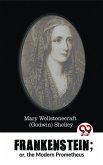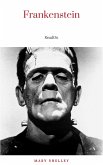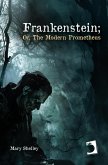In "Frankenstein; Or, The Modern Prometheus," Mary Wollstonecraft Shelley crafts a timeless tale that delves into the profound themes of creation, responsibility, and the quest for knowledge. Composed in an epistolary style, the novel intricately weaves the narratives of Victor Frankenstein and his tragic creature, exploring the consequences of unchecked ambition and the ethical dilemmas surrounding scientific advancement. Shelley's work emerges from the Romantic era, highlighting its tension between Enlightenment rationalism and the emotional depth characteristic of her contemporaries. The novel not only serves as a cautionary tale about the perils of man's hubris but also critiques societal norms regarding isolation and acceptance. Wollstonecraft Shelley, the daughter of renowned feminist Mary Wollstonecraft and political philosopher William Godwin, grew up amidst intellectual fervor, which profoundly influenced her literary pursuits. Her experiences with loss, societal rejection, and the burgeoning fields of science and philosophy during the early 19th century drove her to create a narrative that interrogates the moral implications of scientific innovation. This personal and social backdrop enriches her exploration of the monstrous and the human. Highly recommended for readers intrigued by the ethics of science and the nature of humanity, "Frankenstein" remains a pivotal work in the Gothic tradition. Shelley's masterful prose and prescient themes resonate with contemporary discussions on technology and ethics, making this novel essential for anyone seeking to understand the complexities of the human condition.
Dieser Download kann aus rechtlichen Gründen nur mit Rechnungsadresse in A, B, BG, CY, CZ, D, DK, EW, E, FIN, F, GR, H, IRL, I, LT, L, LR, M, NL, PL, P, R, S, SLO, SK ausgeliefert werden.









